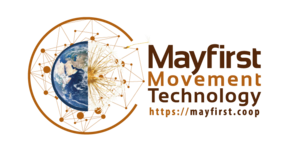May First Movement Technology Podcasts
May First Movement Technology has a podcast! We host a variety of audio content. See below for more details.
Listen!
All shows are displayed below. Enjoy by browsing below or subscribe via your podcast app (). Trouble with that link? Try this one instead: podcast.
-
The Role of Technology in The Rising Majority
A conversation with Alice Aguilar and Jerome Scott on the role of technology in movement strategy.

What if we could collectively develop a strategy that recognized the autonomy and differences of our diverse movements, while unifying our resources and energy toward a common goal? What role would technology play in such a strategy?
The Rising Majority formed in 2017 as “a coalition that seeks to develop a collective strategy and shared practice that will involve labor, youth, abolition, immigrant rights, climate change, feminist, anti-war/anti-imperialist, and economic justice forces in order to amplify our collective power and to build alignment across our movements.”
In 2020 May First joined The Rising Majority to support this effort by contributing our experience with technology and movement building. Please help us fullfil this task! Join May First Board members Alice Aguilar and Jerome Scott in discussing the role of technology in building such a strategy.
Comments from participants
Here are some of the questions comments from the participants.
- Is there interest in placing a priority on ‘supply-chain’ and labor isues relating to the provision of critical materials for the infrastructure that supports web-related movement work? Thinking about worker and environmental conditions with cobalt & lithium mining, colonial legacies, the stuff that phones and laptops and servers are built from.. etc.
- How does Rising Majority feel about FOSS? It denies ‘realization’ to capitalist tech companies. FOSS social media can also bypass attempts at censorship.
- Is Rising Majority only for US or has an ambition to go abroad?
- Information Technology has not only became a lifeline for Capitalism in crisis it has quickly become the primary driver of the neoliberal economy and it will be intricately connected to all other movement struggles.
- It is obviously a huge contradiction that Anti capitalist movement organizations have adopted en masse the worst of the worst of surveillance capitalism driven information technology platforms. There is no denying that these tools have really helped movements expand their reach and facilitate their work in meaningful ways. But there is already and will continue to be a huge price for routing all movement communications through these corporations who are in full cooperation with the state when it comes to surveilling our movements and controlling public opinion.
- All technology that is not guided by movements for liberation and social justice will become carceral technology. This is why the May First project and others are so important. How can we inspire our comrades in Rising Majority to take interest in what we are doing and begin thinking about how they can chart a path out of those corporate internet services?
- Why doesn’t RM notice technology as a critical issue? What’s the need for us as a movement to
- get folx to notice that tech is a crucial element and always has been present as, a factor in oppression (eg the Luddites). Are we too overinvolved in our academic-type and identitarian focuses?
- I’m curious as to how RM sees its relationship to groups that are not 501c3 or c4 organizations with paid staff. I guess I"m assuming that the groups do have paid staff, is that true or partially true?
- There is SO MUCH to talk about technology and its impacts! Maybe we should concentrate on how techonology affects social movements and our relations..which I believe is basically the issues of privacy and autonomy..that is the right to organize and discuss privately and the right to communicate freely, that is on platforms that we control, with no commercial interference and data collection without consent
- The discourse of Power and revolution changed dramatically within movements in Mexico after the Zapatista uprising in 1994 and a grassroots strategy that seeks to “change the world without taking power” became a very influential political vision here.
- There is a difference between authoritarian “Power over something” and agency and autonomy, the “power to do something” which I want to believe movements who use a discourse of power are really talking about.
- People talk about global but the reality is the majority of the world remains unconnected… technology affects them in the ways that it the neoliberal economy it fuels displaces these people, consumes their natural resources and destroys their environments and forces them to migrate.
- Tech made it possible for capitalism to go global - the shift to computerization and high speed digital info transfers.
- When talking about technology being used for the rich, I think about how Cuba uses technology for the people. I need to raise this question to friends in Cuba who I’m still in contact with.
- y la tecnología digital no debe ser “obligatoria” o la única forma de acceso (vivas donde vivas)
- The Internet started based on open source tech, and it still runs on that, eg. the DNS system. We simply do not take advantage of this; the answer is to stop using tech that exploits us and move to using and creating more and more open tech.
- this is where it’s great ot understand the history of tech and specifically how it relates to our movements - and how it’s changed - we used to control our tech (for a brief moment)
- “For Indigenous nations to live, capitalism must die. And for capitalism to die, we must actively participate in the construction of Indigenous alternatives to it.” - - Glen Sean Coulthard - Red Skin, White Masks: Rejecting the Colonial Politics of Recognition (p. 173)
- +1 to above, and noticing that we need to be building alternatives to capitalism too. We need anti-capitalist technology and we will have to create it ourselves.
- Yes, we can’t just be constantly against something or other, taking it down, deconstructing it. We have to be for something, to be constructive. Where would we be if tomorrow, capitalism and authoritarian domination was gone, where would we be. Are we prepared for that eventuality?
- We will need to build on feminist and intersectional thinking that has evolved approaches to how we engage and interact with one another - human relations technology that can enable organizations that do not use hierarchy and domination, but do have conflict transformation capacities and egalitarian power-to instead of power-over. We need to build structures in which people can learn to live that way.
- What about dual power? Do we have to take over the existing structures begin creating our own autonomous solutions?
- I’m optimistic, but I don’t think we’ll get rid of capitalism in the near future. So, I think we need to figure how to use technology to move our social justice movements in this country now.
- Here’s the link to Freedom Circles signup if anyone would like to join us! (Rising Majority) https://linktr.ee/freedomcircles
- I would narrow the scope about technology and a group like RM to technology that supports building movements (security and organizing needs)- as opposed to spending time on the “other” issues about technology.
- We need to be working more closely with comunity network projects.
- right on! love where this is going…it also makes me think about the impact of tech within the context of climate collapse & healing the planet.
- I’m curious how AI will impact our technology and our movements.
- there is SO MUCH to talk about technology and its impacts! Maybe we should concentrate on how techonology affects social movements and our relations..which I believe is basically the issues of privacy and autonomy..that is the right to organize and discuss privately and the right to communicate freely, that is on platforms that we control, with no commercial interference and data collection without consent
- yes how do we change the world without taking power!
- What technologies do we use to fight capitalism? FaceBook? Twitter, email lists?? What social media can we use?
- totalmente! ser solidaries sin paternalismos sino desde (re)vincularnos con esas luchas
- my work experience in technology has led to opportunities to provide technical support for organizing outside the U.S. I don’t feel like organizers elsewhere need my opinion on their work
- y la tecnología digital no debe ser “obligatoria” o la única forma de acceso (vivas donde vivas)
- this is where it’s great ot understand the history of tech and specifically how it relates to our movements - and how it’s changed - we used to control our tech (for a brief moment)
- some years ago, I visited a digital technology center in Havana. They were very current then and I suspect they are still are
- We need to be working more closely with comunity network projects.
-
Turning up the heat on Big Tech
NOTE: The english recording is split into two recordings representing the introduction and start of the webinar and the rest of the webinar. Due to technical difficulties, the quality of part one (the player on the left) is poor. The quality of part two (the player on the right) is better.
Ongoing apartheid violence in occupied Palestine, brutal anti-worker retaliation against organizing warehouse workers, and criminalization and violence against communities of color globally all depend on surveillance capitalism’s infrastructure – largely fueled by Amazon’s and Google’s military and police contracts. Join us for a panel bringing together movement voices who are turning up the heat on the unapologetic role of Google, Amazon, Zoom, Facebook and others in upholding and expanding the reach of state violence.
The speakers featured Matyos Kidane (Stop LAPD Spying), Dr. Rabab Abdulhadi, and Jonathan Bailey (Amazon International).

-
Get the Tech Off My Body! Recording and resources
Overturning Roe v. Wade in the United States and restricting access to abortion throughout the Americas is part of a strategy of repression that is focused on our bodies. The strategy not only targets reproductive justice, but also transgender rights, the mobility of poor people and people of color, and access to health care and other critical services. In this webinar, we’ll hear from May First members involved in the struggle and discuss the relationship between the struggles for reproductive justice, privacy, autonomy, and freedom from surveillance. How can our campaign to re-envision technology based on consent and liberation contribute to our movement’s struggle for reproductive justice?
On June 21st, 2022 May First, along with May First members the Progressive Technology Project, the National Network of Abortion Funds, and the Detention Watch Network organized a webinar to discuss the technology implications of over turning Roe v. Wade.
Listen by clicking the play button above, or see the collection of resources the panelists and participants compiled during the webinar.
Collected Resource from the webinar
- Riana’s blog post about abortion privacy & encryption
- EFF abortion privacy & security tips
- Talk about abortion criminalization, “Jailed by a Google Search”
- Politico article about abortion privacy & security (6/20)
- “My Body, My Data Act”
- Ale Link Tree
- American Dragnet Data-Driven Deportation in the 21st Century
- Defunding the Dragnet
- End Abusive Surveillance of Immigrant, Black & Brown Communities
- Hacking//Hustling
- EFF - Street Level Surveillance
- Detention Watch Network: Defund Hate
- Mijente No Tech For ICE Campaign
- Time Magazine - Abortion Surveillance
- Digital Security for Abortio Poster
- From Data Criminalization to Prison Abolition
- De-criminalize Abortion
- Facebook tracking abortion
- Shout your abortion
- Join Mayfirst or if a member, get involved
Panelists

Alejandra Poblas is a reproductive justice organizer and storyteller at the intersections mass incarceration and immigration. She shares her incarceration and abortion story as an act of resistance to fight abortion stigma and bring awareness to abolition and racial justice.

Alice Aguilar’s (moderator) life work focuses in supporting indigenous people’s rights, environmental justice, and reproductive justice issues. Alice’s current work involves leading the fight against racism and sexism in technology, bringing women, queer and Trans people of color into movement technology, and winning respect for the people of color already doing technology work within social justice movements.

Riana Pfefferkorn is a Research Scholar at the Stanford Internet Observatory. She investigates the U.S. and other governments’ policies and practices for forcing decryption and/or influencing the security design of online platforms and services, devices, and products, both via technical means and through the courts and legislatures. Riana also studies novel forms of electronic surveillance and data access by U.S. law enforcement and their impact on civil liberties.

Kim Varela-Broxson works for the The National Network of Abortion Funds. The National Network of Abortion Funds builds power with members to remove financial and logistical barriers to abortion access by centering people who have abortions and organizing at the intersections of racial, economic, and reproductive justice.

May First Movement Technology engages in building movements by advancing the strategic use and collective control of technology for local struggles, global transformation, and emancipation without borders.
-
Puerto Rican Socialist Party Oral History Need To Know
During the 1970’s the Puerto Rican Socialist Party was the largest and most powerful Puerto Rican revolutionary organization in the U.S. and a major force within the U.S. Left. A recently published book (Revolution Around the Corner: Voices from the Puerto Rican Socialist Party in the United States), written by people involved in the PSP then, offers a lesson-filled oral history of the organization and its work. This Need to Know features some of those people.
This is an event every person interested in changing this country should attend. The lessons of that period and that organization are of great value today.
The slide show referenced in the talk is available for download.
-
Ame Elliot - Ux Design For Shifting Power
Ame Elliot - UX Design for shifting power
2021-07-02: Ame Elliot talks about her work at Simply Secure providing design support and coaching for technology projects that center and protect vulnerable populations. Follow the pdf presentation.

Ame Elliot is the Design Director for Simply Secure, an educational nonprofit building a community of professional practitioners who put people at the center of privacy, security, transparency, and ethics.
Additional references:
- Pattern Library for Decentralization
- Simply Secure’s Knowledge Base
- Participant Rights
- Wire framing
- Make it physical, print it out. Pin it up. Look at it
-
Nechari Riley - Human Centered Research
Nechari Riley - Human Centered Research
2021-07-25: Nechari Riley shares insights from her journey to becoming a “people powered” UX Design researcher. Follow the pdf presentation

Nechari Riley is a mixed-methods user researcher and strategist who works with organizations to develop research-informed projects that are inclusive, accessible, and engaging.
-
Victoria Barnett - Design Justice
Victoria Barnett - Design Justice
2021-06-18: Victoria Barnett introduces us to the Design Justice Principles and her work supporting the growth of the Design Justice Network . Follow the pdf presentation

Victoria Barnett is a digital graphic designer, facilitator, community organizer and collaborator at the service of social justice initiatives. Her work is based on the Principles of Design Justice.
Additional references:
- How the design justice principles were generated, See venn diagram exercise.
- Useful questions to ask, see page 7
- Tips on how to organize a local node Can apply to Working group
- Zines
-
The Congressional Invasion, the Biden Presidency: What happens now?
Biden is President. The Congress is over-run by right-wing thugs. We are in a new era. Now what? What do we demand of this new administration? What should we expect from this new situation? What do we think this new administration is going to do…what should we be doing?
Presentations by Jerome Scott, Maritza Arrastia and Ken Montenegro, followed by small group discussions (not recorded) followed by report backs.
[Unfortunately the beginning of the session is missing. It picks up just after Jerome begins his presentation.]
-
2020 Membership Meeting Dues Proposal
This presentation covers the proposal for re-structuring how we price the dues for membership.
-
2020 Membership Meeting on Coop And Engagement
The Coop and Engagement membership meeting discussion covered how best we can engage our members in our organizing and operations work.


